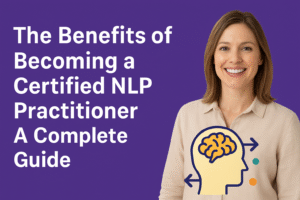Becoming a Certified NLP Practitioner can be a life-changing decision for professionals in coaching, therapy, education, and personal development. Neuro-Linguistic Programming (NLP) is more than just a set of techniques—it’s a powerful framework that helps people understand how language, thought patterns, and behaviors are connected. With the right NLP training, you can help others break through emotional blocks, improve communication, and achieve lasting transformation.
In this guide, we’ll explore what NLP is, why certification matters, and the many benefits of becoming a Certified NLP Practitioner. Whether you’re a coach, therapist, educator, healthcare provider, or simply passionate about personal growth, this article will help you see how NLP can expand your skills and open new opportunities.
What is NLP (Neuro-Linguistic Programming)?
NLP stands for Neuro-Linguistic Programming:
-
Neuro: How we experience the world through our senses and nervous system.
-
Linguistic: How language shapes our thoughts and interactions.
-
Programming: The unconscious patterns and behaviors we repeat daily.
Put simply, NLP is about understanding the “language of the mind.” By learning NLP, you gain tools to help yourself and others reframe negative thoughts, overcome limiting beliefs, and create new patterns for success.
For example, someone struggling with public speaking anxiety might use NLP visualization and anchoring techniques to replace fear with confidence. Therapists use NLP to help clients heal from trauma, while educators use it to enhance student learning and motivation.
If you’d like to explore structured NLP learning, check out the NLP Practitioner Certificate Program.
Why NLP Certification Matters
Anyone can read about NLP techniques, but becoming a Certified NLP Practitioner gives you formal training, credibility, and confidence in applying these methods with clients or students. Certification ensures you:
-
Gain hands-on practice with NLP tools.
-
Learn directly from experts in the field.
-
Follow a structured curriculum accredited by recognized associations.
-
Receive an official certificate that validates your skills.
Just as therapists, coaches, or mindfulness teachers benefit from formal training, NLP certification gives you both practical expertise and professional recognition.
Benefits of Becoming a Certified NLP Practitioner
 Here are the key benefits of pursuing NLP certification, explained in detail:
Here are the key benefits of pursuing NLP certification, explained in detail:
1. Improved Communication Skills
At its core, NLP is about communication—both with ourselves and with others. Certification training equips you with techniques like mirroring, reframing, and sensory acuity that improve listening and empathy. These skills are invaluable for therapists, coaches, teachers, and even business leaders.
2. Emotional Intelligence and Self-Awareness
By studying NLP, you learn to identify patterns in your own thinking and behavior. This self-awareness allows you to manage stress, shift limiting beliefs, and build resilience. As a practitioner, you can then guide clients through the same transformation.
3. Helping Clients Overcome Emotional Barriers
NLP techniques such as anchoring, timeline therapy, and reframing can be applied to help people address challenges like:
-
Anxiety
-
Phobias
-
Trauma
-
Addictions
-
Low confidence
-
Negative habits
Certified practitioners often report that these tools bring faster results than traditional coaching methods.
4. Expanded Career Opportunities
With NLP certification, you can:
-
Add new services to your existing practice.
-
Offer specialized NLP sessions for personal development.
-
Integrate NLP into coaching, therapy, or education programs.
-
Work with individuals, groups, or organizations.
For example, educators use NLP to make lessons more engaging, while healthcare professionals use it to improve patient communication.
5. Professional Credibility
Clients often seek certified practitioners for assurance that they are working with someone who has formal training. Certification from an accredited program boosts your reputation and trustworthiness.
6. Personal Transformation
Beyond professional growth, many students find NLP personally life-changing. By applying NLP techniques to your own life, you can:
-
Build confidence.
-
Improve relationships.
-
Break bad habits.
-
Develop a success mindset.
7. Flexibility and Accessibility
Online NLP certification programs make it possible to study at your own pace. You can balance learning with your work and personal commitments while still gaining lifetime access to materials.
Who Should Consider Becoming a Certified NLP Practitioner?
NLP certification is highly versatile. It benefits:
-
Therapists – to enhance therapy outcomes.
-
Coaches & Mentors – to empower clients more effectively.
-
Educators – to motivate students and improve learning.
-
Meditation & Yoga Teachers – to deepen the mind-body connection.
-
Healthcare Professionals – to improve patient care and communication.
If your work involves helping others grow, heal, or learn, NLP can strengthen your impact.
NLP Certification: What to Expect
Most NLP certification programs include:
| Feature | Details |
|---|---|
| Duration | Around 12 weeks (self-paced online) |
| Study Hours | 80–100 hours |
| Modules | NLP theory, tools, applications |
| Format | Video lessons, exercises, practice sessions |
| Assessment | Quizzes, practical activities |
| Certification | Accredited by professional bodies |
You don’t need prior experience—programs are suitable for all levels.
Checklist: Signs You’re Ready for NLP Certification
✅ You want to improve communication with clients, students, or patients.
✅ You feel drawn to personal growth and transformation.
✅ You want to expand your professional toolkit.
✅ You’re seeking a recognized certificate to boost credibility.
✅ You enjoy helping others overcome challenges.
If most of these resonate, it may be the right time to pursue certification.
How NLP Connects With Other Disciplines
NLP is not isolated—it complements other areas of personal development. At the School of Positive Transformation, students often pair NLP training with programs such as:
This holistic approach allows you to integrate multiple evidence-based practices into your work.
Real-World Applications of NLP Certification
Let’s look at some practical scenarios:
-
A therapist helps a client reduce anxiety using NLP anchoring.
-
A coach guides entrepreneurs to reframe failure as feedback.
-
A teacher uses NLP language patterns to boost student motivation.
-
A yoga instructor integrates NLP visualization into meditation practice.
-
A healthcare worker applies NLP rapport-building to improve patient trust.
These real-world applications show how versatile NLP can be across industries.
Best Practices When Studying NLP
To get the most from your NLP certification:
-
Practice daily—apply tools on yourself and with peers.
-
Keep a reflective journal of progress.
-
Join NLP study groups or communities.
-
Integrate NLP with existing methods in your field.
-
Stay updated with ongoing research in psychology and communication.
For additional insights on communication and mental well-being, you can explore resources such as Verywell Mind’s NLP Guide.
Conclusion
Becoming a Certified NLP Practitioner is more than just adding a qualification to your resume—it’s about gaining tools that transform lives. From improved communication and emotional intelligence to helping clients overcome challenges, NLP equips you with skills that create real impact.
If you’re ready to unlock these benefits and start your NLP journey, explore the School of Positive Transformation. Our accredited online NLP Practitioner Certificate provides the knowledge, tools, and flexibility to fit your lifestyle.
Take the next step today—Contact Us to learn more about enrollment and start your path toward becoming a Certified NLP Practitioner.




